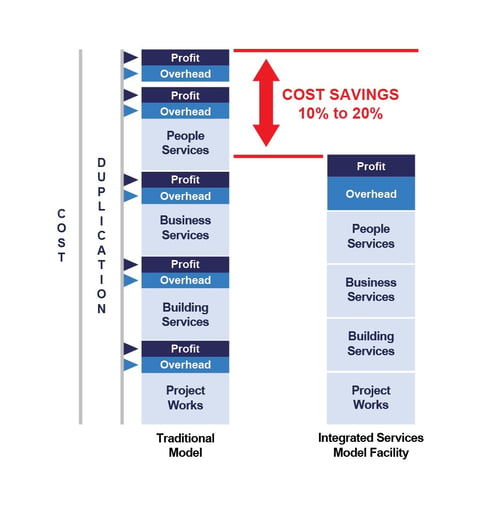The Future of Facilities Management Solutions: Service Consolidation

Over the last two decades facility management services has dramatically changed.
Increased economic instability has left energy executives looking for ways to reduce costs without affecting core operations. Often, facility management (FM) is one area that receives such review.
Typically, facilities management is reactive and performed in-house or through many providers, bundling services on an operational level. This paradigm makes operational costs high, service offerings redundant and limits scalability. Furthermore, processes lack standardization across vendors, and the multitude of contract obligations can become a burden for management at all levels.
How do you navigate change while ensuring stability?
From 90 vendors to 2
Seeking to reduce capital and operational expenditures, a global energy company based in California looked at its real estate expenses as a strategic point for savings.
Their ultimate solution was to consolidate their facilities management vendors from 90 separate contracts into two primary partnerships, initially awarding Sodexo soft FM services, and eventually full IFM capabilities across 100 buildings at 47 sites in the United States.
This result was an immediate cost saving resulting from streamlined labor expenses, process standardization, supplier safety alignment and optimization of real estate.
Implementing this consolidation was ambitious, but once our client gave us the green light our team mobilized in just three months.
One approach is to opt for consolidated, outsourced FM services. According to a McKinsey paper, the global market for in-house and outsourced facility management services is estimated to reach $1.9 trillion by 2024, with the outsourced segment accounting for over half the market. It is not just a trend, it is the future of FM.
Some important benefits of consolidating FM services include:
- Cost-saving: Streamlining service delivery reduces operational costs.
- Focus on core business: Operation leaders can focus on managing their specialized teams
- Improved service levels: Consolidating service providers reduces inefficiencies, redundancies and inconsistencies in service delivery
- Scalability: IFM is a long-term strategic approach that drives standardized processes throughout the organization
- Flexibility: IFM services are highly customizable to client-specific needs
At Sodexo, our Integrated Facility Management services help to manage facilities more efficiently and effectively. Our goal is to improve your competitive advantage by delivering comprehensive service solutions.
Our operational approach is to self-perform, providing our clients with specialized services through alliance relationships across portfolios. Our IFM solutions drive operational efficiencies and provide strategic focus by giving our clients:
- One transparent agreement
- Reduced overhead expenses
- One single management team
- Consistency in standards, communication and reporting
- Performance-based to mitigate risks
- Centralized FM Operations.
In addition to effective change management, making the switch to IFM solutions takes a substantial amount of planning. Identifying and onboarding key stakeholders by building business cases and designing a robust implementation roadmap are key to a successful transition.

Learn more on how we improved FM services whilst reducing costs.